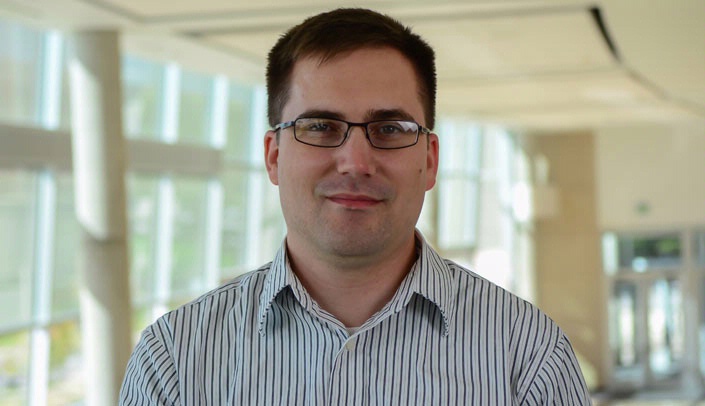As a cancer researcher and survivor, Nicholas Woods, Ph.D., knows about the need for more advances in cancer diagnosis and treatment.
He studies the biology of cancer.
The Fairfield, Neb., native had a rare cancer — chondrosarcoma — a cancer of the cartilage tissue that surrounds the bone. There was no history of cancer in his family. He was diagnosed in 2011, when he was 29 years old.
He and his family found there are few places that specialize in treatment of this type of cancer. One physician suggested removing his left leg and part of his left side. A doctor with a second opinion thought differently.
They traveled to Boston where he had surgery, followed by two months of recovery and six weeks of radiation therapy.
“It was intense treatment,” said Dr. Woods, an associate professor in the UNMC Eppley Institute for Cancer Research and Allied Diseases. “It gives me a different perspective — learning information about cancer itself.
“When patients hear they have cancer, they want to know who’s the doc and when they’ll be able to get back on their feet. Having cancer is a learning experience.”
On the 10th floor of The Lied Transplant Center, Dr. Woods and his colleagues help contribute to the body of knowledge and global understanding of cancer.
“What I’m doing will help someone who has cancer through a potential new treatment, a better chance for survival. It gives me a sense of urgency.”
He said cancer is often caused by disruptions in genes that control DNA repair, and these same genes often influence cancer patient response to chemotherapeutics.
“My research is focused on discovering how the proteins in cells interact with each other and to understand how these interactions are disrupted in cancer,” Dr. Woods said. “We use mass spectrometry to identify interactions with a protein of interest and determine the differences between normal and cancer cells.
“By studying how protein interactions are altered in cancer, we hope to identify new targets for anti-cancer therapies.”
